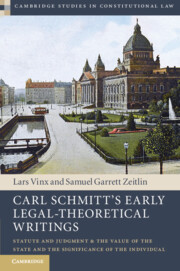 Carl Schmitt's Early Legal-Theoretical Writings
Carl Schmitt's Early Legal-Theoretical Writings A Note on the Text and the Translation
Published online by Cambridge University Press: 17 April 2021
Statute and Judgment offers Schmitt’s theory of adjudication. Schmitt responds to the attack on legal determinacy that is associated with the free law movement (a German precursor to pragmatist and critical approaches to adjudication). While Schmitt adopts the view, as put forward by proponents of the free law movement, that statutory law is inherently indeterminate and must fail to guide judicial decision-taking in particular cases, Statute and Judgment aims to reconstruct legal determinacy on the basis of an analysis of the customs and conventions of legal practice. Schmitt’s attempt to show how legal determinacy is possible prefigures later arguments to the effect that a situation of normality is a condition of the legitimate applicability of legal norms.
To save this book to your Kindle, first ensure [email protected] is added to your Approved Personal Document E-mail List under your Personal Document Settings on the Manage Your Content and Devices page of your Amazon account. Then enter the ‘name’ part of your Kindle email address below. Find out more about saving to your Kindle.
Note you can select to save to either the @free.kindle.com or @kindle.com variations. ‘@free.kindle.com’ emails are free but can only be saved to your device when it is connected to wi-fi. ‘@kindle.com’ emails can be delivered even when you are not connected to wi-fi, but note that service fees apply.
Find out more about the Kindle Personal Document Service.
To save content items to your account, please confirm that you agree to abide by our usage policies. If this is the first time you use this feature, you will be asked to authorise Cambridge Core to connect with your account. Find out more about saving content to Dropbox.
To save content items to your account, please confirm that you agree to abide by our usage policies. If this is the first time you use this feature, you will be asked to authorise Cambridge Core to connect with your account. Find out more about saving content to Google Drive.